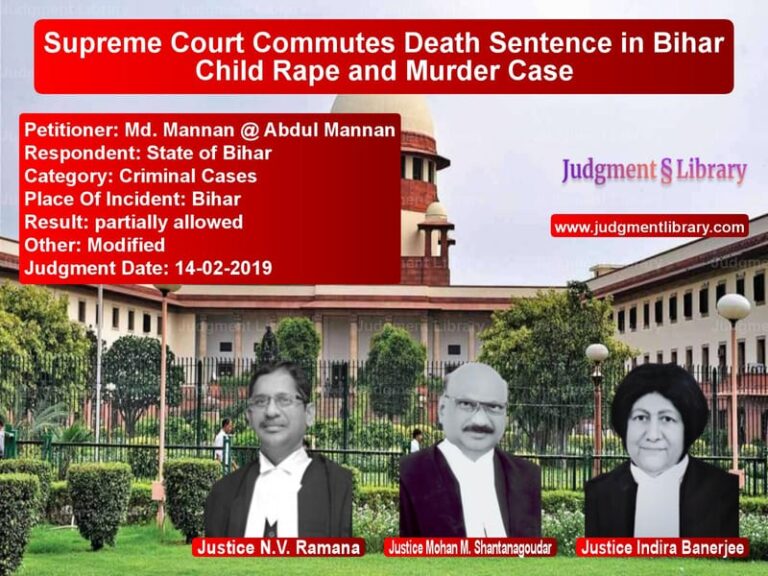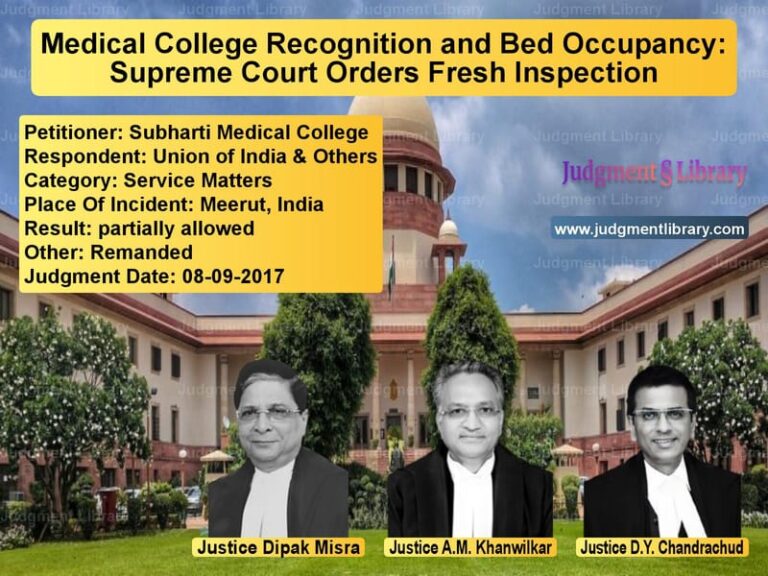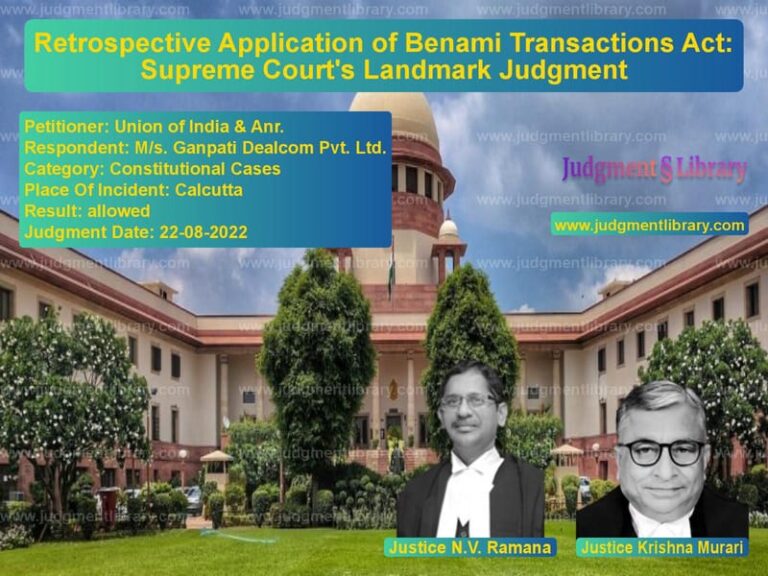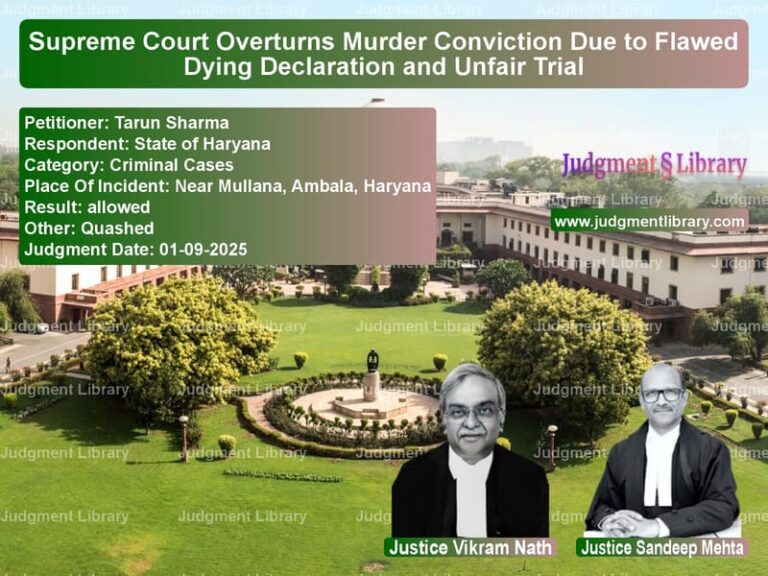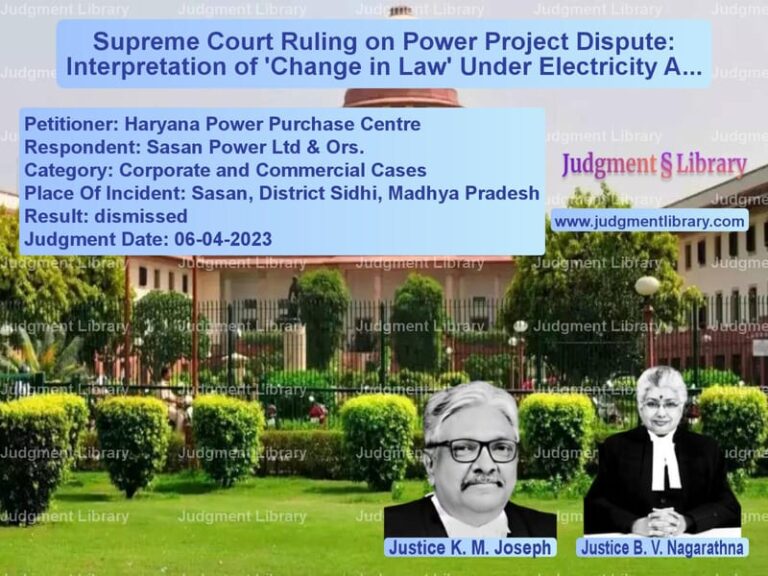Supreme Court Rules on Tax Exemption for Royal Residences: Maharao Bhim Singh vs. Commissioner of Income-Tax
Tax exemptions for former rulers have been a complex issue in Indian law, especially concerning their official residences. The Supreme Court’s ruling in Maharao Bhim Singh of Kota vs. Commissioner of Income-Tax, Rajasthan-II, delivered on December 5, 2016, provided clarity on whether rental income from a requisitioned portion of a royal palace remains exempt under Section 10(19A) of the Income Tax Act, 1961. This case reaffirmed that a former ruler’s official residence, once declared exempt, should not be partially taxed.
Background of the Case
The appellant, Maharao Bhim Singh, was the ruler of the erstwhile princely state of Kota. His property included two significant palaces: Umed Bhawan Palace and City Palace. These palaces were officially declared as his residences under the Part B States (Taxation Concessions) Order, 1950. However, in 1976, a portion of Umed Bhawan Palace was requisitioned by the Ministry of Defence under the Requisition and Exhibition of Immovable Property Act, 1952. The government began paying the appellant ₹80,000 annually as rent for the requisitioned portion.
For the assessment year 1978-79, the tax authorities questioned whether the rental income from the requisitioned portion of the palace should be taxable. The appellant argued that the entire palace was his official residence and should remain exempt under Section 10(19A) of the Income Tax Act. However, the Revenue contended that the exemption only applied to the portion occupied by the ruler.
Legal Provisions in Question
- Section 10(19A) of the Income Tax Act, 1961: This section exempts the annual value of one palace of a former ruler, provided the Central Government had declared it as their official residence before the abolition of privy purses.
- Part B States (Taxation Concessions) Order, 1950: Issued by the Central Government, this order granted tax exemptions to former rulers for specified properties.
- Requisition and Exhibition of Immovable Property Act, 1952: Under this Act, the government could requisition private properties for public use.
Petitioner’s (Maharao Bhim Singh) Arguments
- The entire Umed Bhawan Palace was designated as his official residence by the Central Government, and hence, it should be fully exempt from tax.
- The requisition was done by the government, and the ruler should not be penalized for circumstances beyond his control.
- The tax exemption under Section 10(19A) applies to the “palace” as a whole, and there is no provision in the law to split it into taxable and non-taxable parts.
- Previous tax assessments (from 1973-74 to 1977-78) had recognized the full exemption, and there was no justification for changing this interpretation.
- Tax exemptions should be interpreted liberally in favor of the taxpayer, especially when historical concessions are involved.
Respondent’s (Commissioner of Income-Tax, Rajasthan-II) Arguments
- The exemption under Section 10(19A) should apply only to the portion of the palace actually occupied by the ruler.
- Any part of the property that is rented out or requisitioned should be considered for taxation.
- The Rajasthan High Court, in Maharawal Laxman Singh vs. Commissioner of Income-Tax, ruled that rental income from a ruler’s palace is taxable if it is not used for personal residence.
- The appellant had received rental income from the government, which should be treated as regular taxable income.
Supreme Court’s Judgment
The Supreme Court, comprising Justice Ranjan Gogoi and Justice Abhay Manohar Sapre, ruled in favor of the appellant. The key observations were:
- The term “palace” in Section 10(19A) should be understood as referring to the entire property, not just the part occupied by the ruler.
- The Income Tax Act does not contain language allowing the division of a palace into taxable and non-taxable portions.
- The exemption should be interpreted liberally, as it was granted to compensate former rulers after the abolition of privy purses.
- Since previous assessments had exempted the entire property, there was no justification for changing the interpretation for the current assessment year.
- If the government itself requisitioned a part of the property, the taxpayer should not suffer financial consequences as a result.
Impact of the Judgment
The ruling has significant implications for former rulers and tax law in India:
- Consistency in Tax Treatment: Tax exemptions granted in previous years cannot be arbitrarily withdrawn without justification.
- Protection of Historical Concessions: The judgment reinforced that benefits given to former rulers should be maintained.
- Prevention of Partial Taxation: A palace declared as a ruler’s official residence cannot be divided into taxable and non-taxable sections.
- Government-Imposed Requisition Does Not Affect Exemption: If a part of the property is requisitioned, the exemption should still apply.
Key Legal Takeaways
- Tax Exemption for Rulers: Section 10(19A) provides a blanket exemption for a ruler’s official residence.
- No Splitting of Palaces: The Income Tax Act does not permit a palace to be divided for taxation purposes.
- Government Actions Cannot Penalize Taxpayers: If a property is requisitioned, it remains exempt.
- Consistency in Taxation: Past assessments should serve as a precedent unless material changes occur.
Conclusion
The Supreme Court’s judgment in Maharao Bhim Singh vs. Commissioner of Income-Tax reinforces the principle that tax exemptions for former rulers must be honored consistently. The ruling protects the interests of individuals who rely on historic exemptions and ensures fairness in tax administration.
Don’t miss out on the full details! Download the complete judgment in PDF format below and gain valuable insights instantly!
Download Judgment: Maharao Bhim Singh o vs Commissioner of Inco Supreme Court of India Judgment Dated 05-12-2016.pdf
Direct Downlaod Judgment: Direct downlaod this Judgment
See all petitions in Income Tax Disputes
See all petitions in Judgment by Ranjan Gogoi
See all petitions in Judgment by Abhay Manohar Sapre
See all petitions in allowed
See all petitions in supreme court of India judgments December 2016
See all petitions in 2016 judgments
See all posts in Taxation and Financial Cases Category
See all allowed petitions in Taxation and Financial Cases Category
See all Dismissed petitions in Taxation and Financial Cases Category
See all partially allowed petitions in Taxation and Financial Cases Category

